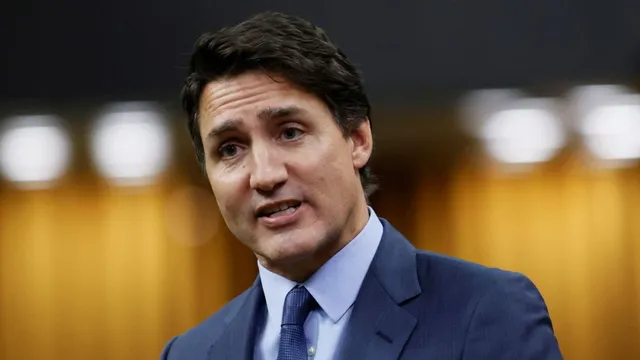- By Shivangi Sharma
- Mon, 06 Jan 2025 07:22 PM (IST)
- Source:JND
As Canadian politics heats up, speculation surrounding Prime Minister Justin Trudeau’s future has intensified. Sources familiar with the Prime Minister’s plans indicate that Trudeau is increasingly likely to announce his intention to step down. However, the source, speaking to Reuters on Sunday, emphasised that Trudeau has not yet made a final decision regarding his resignation.
The rumours of Trudeau’s possible departure come after a report by the Globe and Mail, which suggested that the Prime Minister could announce his resignation as early as Monday, January 6, 2025. This would mark the end of Trudeau’s nine-year tenure as the leader of Canada’s Liberal Party, during which he has navigated a range of domestic and international challenges.
While Trudeau has not confirmed the reports, speculation about his departure has gained momentum, with political observers citing various factors influencing the Prime Minister’s decision. His leadership has been marked by significant policy decisions on climate change, social issues, and international relations, but he has also faced criticism on issues ranging from economic policies to the handling of the COVID-19 pandemic.
Several Liberal Party leaders have called for Trudeau's resignation, with over 20 MPs signing a petition in October 2024 urging him to step down and not run for a fourth term. Public opinion polls show the Liberals are likely to be defeated by Pierre Poilievre's Conservatives in a landslide, prompting alarm among lawmakers who are seeking a course correction before the next election.
But what led to the downfall of Justin Trudeau, leaving him at a point where he may have to resign before completing his term? In this article, we delve into some of the key issues that have plunged Canada into a political crisis.
Canada’s Housing Crisis And Rising Unemployment
Canada has faced significant challenges under Prime Minister Justin Trudeau, with inflation and a housing crisis heavily impacting the population. Many Canadians have blamed Trudeau's open immigration policy for exacerbating these issues. Between 2000 and 2021, housing prices surged by over 355 per cent, making Canada’s housing market one of the most unaffordable in the world. In addition, the country has struggled with high unemployment rates.
A survey by the Angus Reid Institute revealed that 28 per cent of Canadians considered leaving their province due to housing affordability issues, with this figure rising to 39 per cent among recent immigrants. In response, Trudeau announced a 21 per cent reduction in migration for 2025, cutting the annual intake from 500,000 to 395,000, and admitted that his government had failed to strike the right balance.
Last year, Canada saw its unemployment rate rise to a 30-month high of 6.4 per cent, prompting backlash from Canadians regarding Trudeau's governance.
Key Allies Turn Against Trudeau
Despite continuous efforts by Prime Minister Justin Trudeau to reverse his declining political fortunes, key allies, including Jagmeet Singh, leader of the New Democratic Party, criticised him as a failed leader. Singh vowed to introduce a motion in the House of Commons to bring down Trudeau's government when Parliament reconvenes after the holiday break.
Canadian PM Justin Trudeau expected to announce his resignation before Wednesday, according to The Globe and Mail. pic.twitter.com/HWVeA4ot2z
— Lander Updates➰ (@landernews123) January 6, 2025
Singh called for Trudeau’s resignation after Finance Minister Chrystia Freeland’s departure. While not seeking an election, Singh criticised Trudeau for neglecting key issues like cost of living and housing and focusing on internal party struggles. Reports suggest Trudeau is considering resignation or prorogation.
Strained Ties With India
In September 2023, Canadian Prime Minister Justin Trudeau accused India of being involved in the killing of Hardeep Singh Nijjar, a designated terrorist and Khalistani separatist leader, outside a Sikh temple in Canada. India rejected the allegations as "absurd", prompting both countries to expel diplomats, which significantly strained their relations.
India Canada ties on the brink. Canadian PM Justin Trudeau accuses Indian govt of killing Khalistani leader Hardeep Singh Nijjar in the Canadian Parliament. pic.twitter.com/gXpMrWWuTf
— Sidhant Sibal (@sidhant) September 19, 2023
Trudeau's allegations against India were aimed at appealing to Canada's pro-Khalistani Sikh voter base. However, the absence of solid evidence has sparked international scepticism and domestic criticism, with many Canadians viewing the accusations as a diversion from more pressing national concerns, such as economic stagnation and the housing crisis.
Corruption
Trudeau is facing a corruption scandal involving the defunct Sustainable Development Technology Canada (SDTC), a billion-dollar fund for green technology. The fund was shut down after the Auditor General found conflicts of interest and misuse of funds, with millions allegedly awarded to ineligible recipients. Critics suggest Trudeau's accusations against India were a distraction from this controversy.
Khalistani Controversy
Despite his pro-Khalistani stance for over four years, Trudeau is expected to lose to Pierre Poilievre in the 2025 elections. The Liberal Party has strong ties with Canada's Sikh diaspora, with members like Jagmeet Singh, a pro-Khalistani leader, in the cabinet. However, Khalistani leaders have criticised Trudeau for not doing enough for their cause internationally. The latest setback came when Singh’s NDP announced plans to move a no-confidence motion to topple Trudeau’s minority government.
-1736170620489.jpg)
(Throwback picture of Canadian PM Justin Trudeau attending Khalistani rally)
Trudeau's policies are largely influenced by the Sikh community in Canada, which makes up over 2 per cent of the national population. Canada is home to the largest Sikh population outside India, with approximately 800,000 Sikhs residing there as of 2022.
What’s Next For Justin Trudeau?
The future of Justin Trudeau as Prime Minister largely depends on the political dynamics in Canada, including his party's performance and public support. Several possible scenarios could unfold.
Given the mounting pressure from within his party and declining approval ratings, Trudeau might step down or face increased calls for a leadership change. If this happens, the Liberal Party could undergo a leadership contest, which may result in a new leader ahead of the next election.

